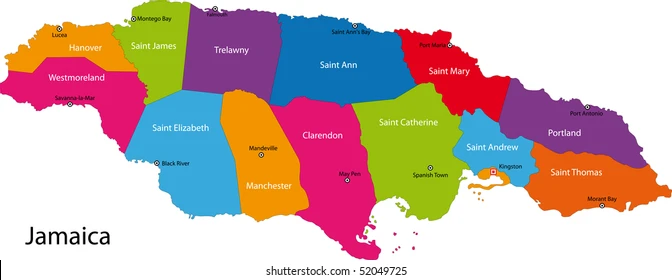What continent is Jamaica in? When discussing the geography of Jamaica, a common question arises: What continent is Jamaica in? The straightforward answer is that Jamaica is part of North America. However, this answer encapsulates a web of historical, cultural, and geographical contexts that are worth exploring to fully understand Jamaica’s place in the world.
Table of Contents
Geographic Context
Jamaica is an island nation situated in the Caribbean Sea. The Caribbean is often considered a region that includes numerous islands and countries scattered between North and South America. Geographically, the Caribbean Sea is bounded by Mexico and Central America to the west and south, and the islands of the Greater and Lesser Antilles to the north and east.
Jamaica itself is the third-largest island in the Caribbean, following Cuba and Hispaniola (shared by Haiti and the Dominican Republic). It lies south of Cuba and west of Hispaniola. This locational context places Jamaica firmly within the Caribbean, which is generally regarded as a subregion of North America.
Continental Classification
The continent of North America comprises three major regions: North America (comprising the United States, Canada, and Greenland), Central America (including countries from Guatemala to Panama), and the Caribbean. Thus, from a continental classification standpoint, Jamaica is part of North America, specifically the Caribbean subregion.
Historical Context
To understand Jamaica’s continental affiliation, one must also delve into its history. The island was originally inhabited by the Taíno people before Christopher
Columbus arrived in 1494, claiming it for Spain. Jamaica remained under Spanish rule until 1655 when the British took control. This colonial history has deeply influenced Jamaica’s cultural and demographic landscape, contributing to its identification within the broader framework of the Western Hemisphere, specifically North America.
Cultural Ties
Culturally, Jamaica has strong ties with the Caribbean region, which collectively shares a history of colonization, African heritage due to the transatlantic slave trade, and a rich mosaic of languages, religions, and traditions. The Caribbean identity is a powerful and unifying factor for Jamaica, setting it apart from the continental masses of North and South America.
Jamaica’s culture, especially its music (reggae and dancehall), cuisine, and sports, has had a significant global impact, further rooting its identity within the Caribbean context. These cultural exports often overshadow its geographical classification, leading to a stronger association with the Caribbean rather than the North American continent.

Political and Economic Affiliations
Jamaica is a member of the Caribbean Community (CARICOM), an organization aimed at promoting economic integration and cooperation among Caribbean nations. CARICOM’s objectives include coordinating foreign policy and collaborating on common interests, further emphasizing Jamaica’s affiliation with the Caribbean region.
Economically, Jamaica’s main trading partners include the United States, China, and other Caribbean nations. The integration of Jamaica’s economy within the Caribbean and its economic ties with North America highlights the interconnectedness of the region.
Geographic Misconceptions
The question of Jamaica’s continental placement can sometimes be clouded by misconceptions. Some might mistakenly associate Jamaica with South America due to the proximity of the Caribbean to northern parts of South America. However, geographically and politically, the Caribbean is considered part of North America.
The misconception might also arise from the cultural and linguistic diversity within the Caribbean, where some islands have stronger cultural and historical ties with South America. For instance, countries like Trinidad and Tobago have a significant population with South Asian heritage, creating a unique cultural blend distinct from the broader North American context.
Geopolitical Boundaries
Geopolitically, the division of the world into continents can sometimes appear arbitrary, especially when considering regions like the Caribbean. Unlike the clearly defined continental boundaries found in Europe, Asia, and Africa, the Caribbean’s inclusion in North America is more a matter of historical and geopolitical convenience than strict geographic delineation.
Continental classifications are not always straightforward and can vary depending on the criteria used (geological, cultural, historical, or political). In the case of Jamaica, its inclusion in North America is primarily due to political and historical reasons rather than a strict geographic boundary.
Environmental and Climatic Factors
Jamaica’s environment and climate also align it with the Caribbean. The island enjoys a tropical maritime climate, characterized by warm temperatures year-round and distinct wet and dry seasons. These climatic conditions are typical of the Caribbean islands, differentiating them from the continental climate patterns found in the mainland areas of North and South America.
The island’s natural environment, with its lush rainforests, mountainous terrains, and pristine beaches, further ties it to the Caribbean ecological zone. This environmental context reinforces Jamaica’s identity as a Caribbean nation within the North American continent.
Conclusion
In summary, while Jamaica is geographically located in the Caribbean Sea, it is considered part of the North American continent. This classification is based on a combination of geographic, historical, cultural, and political factors. Understanding Jamaica’s place in the world requires appreciating its rich Caribbean heritage and its connections within the broader context of the Americas.
Jamaica’s identity is multifaceted, shaped by its indigenous history, colonial past, and vibrant cultural contributions to the world. Whether one approaches the question from a geographic, cultural, or political perspective, Jamaica’s inclusion in North America underscores the complex and interconnected nature of continental boundaries.
Ultimately, Jamaica’s placement within North America does not diminish its distinct Caribbean identity. Instead, it highlights the diverse and dynamic nature of the regions that make up the global landscape. The island’s unique position as part of the Caribbean within the North American continent serves as a reminder of the rich tapestry of histories, cultures, and environments that define our world.


Leave a Comment